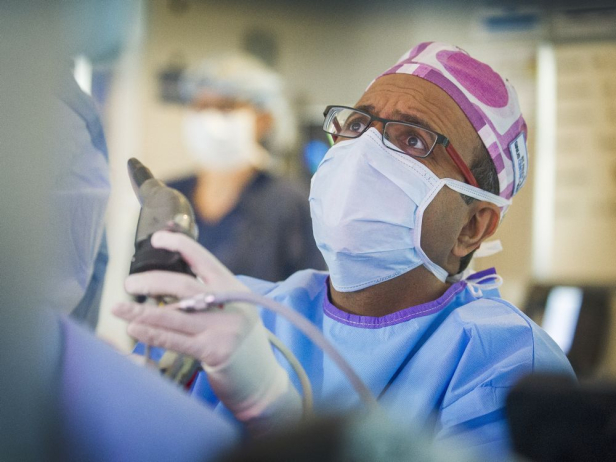As seen in the Vancouver Sun by Pamela Fayerman, 30th April 2019.
A judge has reserved decision on an injunction over the compliance letters B.C. insists doctors must sign

Dr. Amin Javer and his team perform sinus surgery on a patient at False Creek Surgery Centre in Vancouver. That is where Mr. Justice John Steeves had his sinus surgery under a contract with Vancouver Coastal Health. But the provincial government has severed contracts between health authorities and clinics that allow patients to pay for their expedited surgeries. Photo by Arlen Redekop /PNG
Patients are waiting even longer for operations like sinus or breast reconstruction because of the latest government crackdown on private clinics and the surgeons working in them, according to affidavits filed in court.
Sinus surgeon Amin Javer says he can’t even begin to make a dent in the number of patients waiting. That’s because he only gets four operating room days at St. Paul’s Hospital a month, allowing him to handle just 12 to 16 cases monthly.
He also operated on patients at False Creek Surgical Centre. But last fall, the government ordered Vancouver Coastal Health to end its contracts with False Creek because the centre was also taking money from patients who were paying the clinic’s facility fees to get expedited surgery.
Javer was the sinus surgeon who operated on the judge in the continuing constitutional trial launched by Dr. Brian Day. The judge would not be able to get that sinus surgery today because False Creek can no longer do business with the government. Yet False Creek is the only private clinic in B.C. with the sophisticated equipment Javer needs to do delicate sinus surgeries.
Not only can Javer no longer perform publicly funded operations at False Creek, but he’s also doing fewer at St. Paul’s because, as the hospital struggles to deal with growing waiting lists, his operating room days have been cut to eight hours from 10.
He has about 300 patients on a pre-surgical wait-list and another 220 waiting for surgery. “It will take me about four years to get through my current surgical wait-list.”
He used to tell patients they’d get their surgery in 2.5 years. Now Javer, the head of the St. Paul’s Sinus Centre and co-director of ear, nose and throat research at UBC, says he has to tell them the waiting time has gone up to four years.
“There’s no outsourcing at all, so the wait-list at the hospital continues to grow. And there’s no extra time being given to surgeons at public hospitals. All that extra operating room time we were promised hasn’t happened,” he said.
Dr. Nancy Van Laeken, a plastic surgeon who performs breast reconstructive surgery on breast cancer patients, said in her affidavit that the government did not increase operating room time in public hospitals enough to compensate for the private clinic crackdown. That means that fewer surgeries are being done in B.C., she said.
Van Laeken said she has privileges to work at five hospitals but only gets four operating room days in total each month. She is willing to do surgeries 10 days a month, but can’t get more time.
“Because of the limited OR time in the public hospitals, the wait times for surgery … in the public system are very long. For example, many of my patients wait (up to) 48 months for breast reconstruction surgery,” she said in her affidavit, noting that is 42 months longer than the target.
For years, health authorities have paid several private clinics to help because of backlogs of scheduled surgeries. But most private clinics also take patients willing to pay out of pocket for expedited surgery. The NDP government argues it is illegal for clinics and doctors to take money from patients for operations covered by medicare and the government is determined to stamp out the practice.
Last fall, the government introduced so-called compliance letters. Surgeons who do any work at private clinics that have contracts with health authorities must sign statements promising they will not do medically necessary work in both the public and private systems. If they refuse, they are banned from doing publicly funded operations at those private clinics that have contracts with health authorities.
If private clinics don’t agree to the same conditions, they won’t get contracts from health authorities or could have their contracts cancelled.
There are only a few private clinics that have agreed to the terms, including View Royal Surgical Centre in Victoria and the ASC Vancouver Surgical Centre
Javer and Van Laeken are among a group of surgeons who want B.C. Supreme Court Justice Janet Winteringham to issue an injunction to stop the province’s latest stab at clinics until the end of the Day trial, which is being heard by Justice John Steeves. Winteringham has reserved her decision.
The government’s unwavering approach doesn’t end there.
“Doctors who work at Cambie have received warnings from health authority executives that they may lose their surgical privileges in public hospitals if they continue to treat patients wishing to be treated quickly and privately at our facility,” said Day, co-owner of the Cambie Surgery Centre.
Rob Grant, a lawyer for Day, the Cambie Surgeries Corporation and other plaintiffs, calls the government’s actions “authoritarian” and counter-productive because surgeons get a limited amount of time — often only a day a week — in hospital operating rooms. Private clinics have, for over 20 years, allowed surgeons to use their excess capacity to help more patients, he said.
According to the government, the new contracting out policy has not hurt patients and “more scheduled surgeries are in fact being performed.” In the Vancouver Coastal Health region, however, the latest figures show about a third of patients who were waiting for surgery in the last nine months of 2018 were waiting for more than 26 weeks — triple the target numbers. While 86.4 per cent of scheduled operations were completed within 26 weeks, the target is more than 95 per cent.
In Fraser Health, the latest report also shows targets not being met.

 ‘In Their Name’ is the campaign of ‘The BC Wrongful Death Law Reform Society’ – a BC registered non-profit organization comprised of volunteer families who have lost a loved one to wrongful death in BC and were denied access to justice. In response to the biggest human rights issue facing the province today, our goal is to modernize British Columbia’s antiquated wrongful death legislation, which predates confederation (1846). Under current legislation, the value of a human life is measured only by the deceased’s future lost income, so long as they had dependents.
‘In Their Name’ is the campaign of ‘The BC Wrongful Death Law Reform Society’ – a BC registered non-profit organization comprised of volunteer families who have lost a loved one to wrongful death in BC and were denied access to justice. In response to the biggest human rights issue facing the province today, our goal is to modernize British Columbia’s antiquated wrongful death legislation, which predates confederation (1846). Under current legislation, the value of a human life is measured only by the deceased’s future lost income, so long as they had dependents.